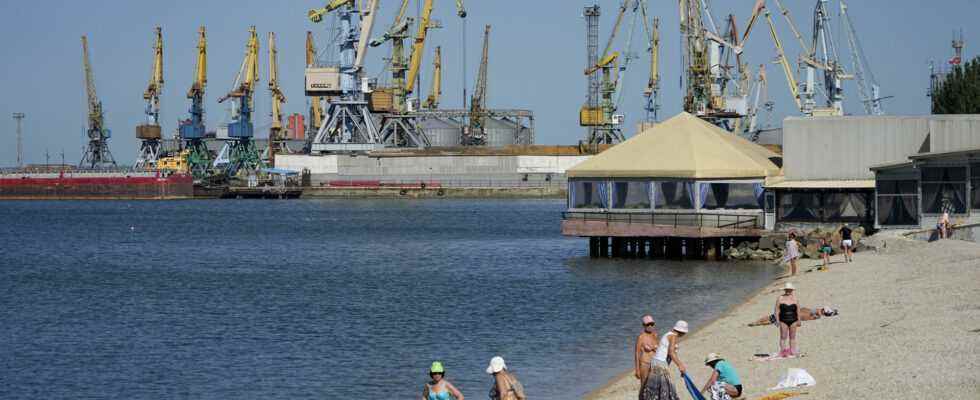Reportage“Le Monde” took part in a press trip organized by the Russian Ministry of Defense to the separatist Donbass and to the regions of southern Ukraine invested after February 24. The message sent is clear: it is time for Russification.
Suddenly, with a roar of engine, the ship sets off, carrying around thirty journalists for a few circles in the water of the port of Mariupol. The bottle-green waves of the Sea of Azov lap gently, the June sun warms the deck. One would almost forget that the ship is military, the port strewn with debris and that the city which extends beyond is a field of charred ruins.
The uneasiness dissipates a little at the sight of a few dozen Mariupolitains who came that day to taste the sweets of the first beach in the city completely cleared of mines. Surreal vision of bodies lying on the sand, at the foot of collapsed buildings, some of which still hide other bodies, these lifeless ones.
The message sent by the Russian army, at the origin of this press trip to the conquered territories of eastern and southern Ukraine, is of the same order: return to normal. The port and its waters were demined at the end of May, the quays largely cleaned. Here it is ready to operate, despite infrastructure 70% destroyed by the fighting.
Three merchant ships have already made the connection with Russia, indicates the director, Pavel Chvatski, with on board metal produced by the famous steelworks of Donbass. The modest objective is set at 1 million tonnes by the end of the year. Above all, these are cereals that the port of Mariupol must export – those produced in the Donbass and even more so in the newly conquered agricultural regions of Zaporizhia and Kherson.
There too, on this subject which worries the whole planet, anxious at the prospect of a major food crisis, the message is clear, hammered home by the leader of the “People’s Republic of Donetsk” (DPR), to which is supposed to be attached Mariupol: “We have the technical capabilities, proclaims Denis Pouchiline, who came especially to meet the journalists. Western sanctions are an obstacle, but there is no shortage of customers, and we can export to third countries who, in turn, will resell the grain. »
Mariupol is emerging from a long nightmare. Two months of siege, a city of 500,000 inhabitants crushed by bombs, civilians dead by the thousands or tens of thousands. The city slowly emerges. The streets are gradually being cleared, the shops are stocked again. The corpses buried in the courtyards during the siege, too close to the surface, are dug up and buried in gigantic improvised cemeteries. Water and electricity are back in some neighborhoods. Gas, no, and the winter could be harsh.
You have 86.6% of this article left to read. The following is for subscribers only.
